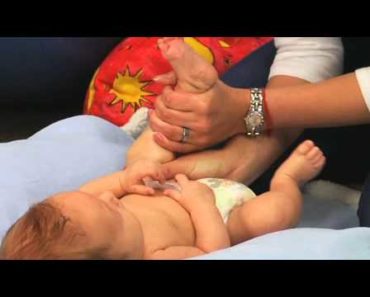After listening to your baby babble for months, hearing their first word is a magical experience for the parents. However, after speaking the first word, babies have to hit many milestones before speaking complete sentences correctly. Telegraphic speech is an important stage in your toddler’s journey of language acquisition.
So what is telegraphic speech? When does it start? Read this post to learn the meaning, features, age of development, importance, and ways to encourage telegraphic speech in toddlers.
When toddlers are developing speech, they tend to speak multi-word sentences with only the key content words. This is called telegraphic speech(1).Telegraphic messages are a simplified version of the language and break grammatical rules. This form of speech is a part of the normal language acquisition process(2).
Telegraphic sentence formation is similar to the short messages consisting of only keywords sent via telegraph in the olden times. Hence, this speech pattern of babies and toddlers is referred to as telegraphic speech.
Examples Of Telegraphic Speech
The telegraphic speech can comprise two-word and multiple-word sentences. Here are a few example sentences that a toddler or baby may speak as part of their telegraphic speech.
At What Age Does Telegraphic Speech Begin?
Children generally start telegraphic speech between the ages of 24 and 30 months. This comes after the two-word stage that occurs at 18-24 months(3).
The two-word stage is preceded by the holophrastic stage, where babies speak single words to express meanings similar to complete sentences. The stage occurs between 9-18 months.
Children then move to the two-word stage, speaking short two-word sentences with semantic relations between the two words. From here, toddlers progress to the telegraphic stage, speaking sentences with two words and more.
Features Of Telegraphic Speech
Here are a few notable features of a toddler’s telegraphic speech(4).
- Only crucial sentence elements are present
- The order of elements is mostly correct
- Words are linked together, but it cannot be considered a proper sentence
- Grammatical elements, such as articles (the, a), prepositions (on, in), auxiliaries (is, are), prefixes, pronouns, and conjunctions, are often missing
- Tense morphemes, such as ‘ing,’ ‘ed,’ ‘s,’ and plurals are mostly absent
Why Is Telegraphic Speech Important For Development?
Telegraphic speech is one of the milestones of language development. Here is how it helps toddlers.
- Helps in understanding sentence formation: When toddlers use telegraphic speech, the words are generally in the correct order. They also use nouns and verbs. While they may not understand grammar, they learn sentence construction at this stage. This helps them become adept at using structurally correct sentences gradually. Thus, the use of telegraphic speech has a positive effect on language development.
- Useful in communication: At this age, children understand their needs and surroundings better. They want to share their requirements and experiences with their parents. Inability to properly communicate can be frustrating for them. Telegraphic speech helps toddlers express their thoughts and feelings effectively.
- Useful in transitioning to the next stage of language development: Practicing sentence construction can help toddlers transition to the next stage of language development easily. Within the next few months, they understand all commands and expand their vocabulary. Soon they start figuring out complex sentence structures and slowly learn to speak grammatically correct sentences.
Telegraphic Speech Activities For Toddlers
A few activities can help children practice their telegraphic speech.
1. Coloring and conversations
Buy a coloring book suitable for toddlers. It should have different elements for coloring purposes. Guide the toddler in the process of coloring by asking the right questions. This can encourage them to express themselves and experiment with telegraphic speech.
For instance, if it is a nature scene with animals, trees, and sky, ask the child, “What is that?” by pointing toward a particular object in the book. If they give a one-word answer such as “tree,“ say the full sentence, “Yes, that is a tree.”
You can ask a follow-up question before they start coloring, such as, “What should be the color of the tree leaves?” If the child gives a one-word answer “green,” speak the complete sentence by saying, “The color of the tree leaves is green.” In case they answer using telegraphic speech, show appreciation.
2. Telegraphic story questions
Use stories for language development. You can tell your own stories or read from a book. This helps create word associations in the toddler’s mind.
Ask them questions in between to increase their interest and help them absorb more information about the language. For instance, if it is a story about a bird who sings, you can ask, “Who sings?” If they answer “bird” or state the bird’s name, offer praise. If they give one-word answers or do not answer at all, you can say, “The bird (or its name) sings.”
Encourage discussion of the story once you are done reading it.
3. Whose-What? game
Fun games can help toddlers pick new words faster and remember them better. In this game, collect pictures of everyone in the house. Gather personal items belonging to each of these individuals in a box. Keep the box and pictures pile in front of the child. Choose any one item from the box and ask the child, “Whose (item name) is it?” Ask the child to select the photograph of the person it belongs to and encourage them to say the person’s name a loud.
4. Follow the leader
In this game, the follower has to copy whatever the leader does and speaks. Whenever you are out with your toddler, point out anything and explain it. For instance, point to a bike and say, “A bike.” The toddler has to point to the same object and repeat the sentence after you. Encourage your child to take the next turn and describe any object they see. In each of your following turns, continue to add more words while describing the objects to help the toddler learn new words.
How To Encourage Telegraphic Speech?
The following techniques can be used to encourage telegraphic speech in toddlers.
1. Model correct language
Research hypothesizes that children can pick up certain structures of language such as pitch, loudness, tempo, and rhythm by listening(5). They can use these cues to figure out the linguistic units. So, it is important to model correct language(6).
Parents can model correct language by speaking complete sentences even if the toddler relies on telegraphic speech(7).Use the correct grammar and pronunciation even if the child says something wrong(8). For instance, if the toddler says, “I pay” while picking the toy, say the correct sentence, “Yes, I understand you want to play.”
2. Respond to gestures
Babies in holophrastic and two-word stages of communication often use gestures in conjunction with talking. For instance, they may use a specific gesture when they want a specific toy or when hungry. Respond to the gestures by fulfilling their need or intent. For instance, if the toddler wants to play and uses a gesture or points at the toy, say, “Okay, let’s play” before bringing the toy. The age-appropriate use of gestures can help early language development, laying the foundation for telegraphic speech(9)(10).
3. Take the help of fun activities
You can use fun activities in the following way to improve a toddler’s telegraphic speech(11).
- While playing with building blocks or other toys, use words to describe what is happening. Teach them key elements of a sentence, such as verbs and adjectives, during the activity. Use a new word every time you play.
- As you go about your activities for the day, explain what you are doing, such as cleaning, cooking, or working. Indicate and explain things the toddler senses around him/her in a simple language. Teach them the names of different objects in the house and outdoors.
- Make language learning fun with music. The beats and inflection of music can help toddlers understand different syllables. You can use actions in line with the song’s lyrics to help the toddler learn new words better.
How Many Words Should A Toddler Say?
A toddler is a child aged between one and three years(12). The words they understand and speak can change as per their age(13)(14).
- 12-17 months: The toddler has a vocabulary of four to six words. They can name a person or object using about two to three words, but the pronunciation might be unclear. They understand the meaning of simple phrases and try to emulate simple words they hear.
- 18-23 months: A toddler in this age group has a vocabulary of 50 words, albeit with an unclear pronunciation. They start combining words and speak two-word phrases. Toddlers in this age range can indicate a few body parts when quizzed and answer simple ‘yes and no’ questions. Use of pronouns, such as mine, her, and his, can be observed.
- 24-36months: Toddlers can use at least 100 words by the age of two years. A toddler between the ages of two and three years can use three-word sentences and answer simple questions. They can also understand prepositions, such as on and in.
What Is The Next Stage?
The telegraphic speech stage ends at the age of 30 months, and toddlers gradually begin to speak complex, structured sentences. Their vocabulary increases quickly, and they pick up new words every day between 30-42 months. At 36 months, many children start using functional morphemes. They may use synchronized and embedded sentences such as “I like mummy because she is pretty.”
Children begin to comprehend almost everything they hear. At about 42 months, they are capable of doing the following(15).
- Uttering “Wh” type questions such as “What did you eat?”
- Understanding and using embedded clauses such as “Julie, who is my friend, likes playing with me”
- Comprehending and applying relative clauses in sentences such as “This is the juice that mummy drinks every day”
- Forming reflexive pronouns such as “I hurt myself yesterday”
Children learn a language in stages. It takes about five to six years for a child to acquire their first language. The telegraphic speech stage is a stepping stone to more complex speech patterns. Interacting with parents, other adults, and children of their own age help children learn the language. So, speak to your child as much as possible and encourage them to express their thoughts and emotions.


































